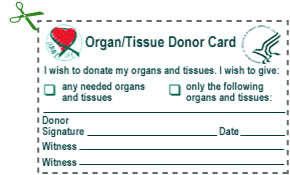National Law

Organ and tissue donation is a gift of life for those in need of transplants. In the United States, organ and tissue donation is governed by a number of laws and regulations that protect donors, recipients, and their families.
The National Organ Transplant Act (NOTA) of 1984 was the first federal law to make organ and tissue donation legal in the United States. NOTA created the Organ Procurement and Transplantation Network (OPTN) to manage the national system of organ and tissue donation. The Network is responsible for matching donors with recipients, and is overseen by the United States Department of Health and Human Services (HHS).
The Uniform Anatomical Gift Act (UAGA) of 2006 is the main legal document governing organ and tissue donation in the United States. The UAGA outlines the process of donation, including who can donate, how decisions are made, and other important details. The UAGA also provides legal protection for donors and their families, ensuring that their wishes are respected.
In addition to the federal laws, each state also has laws that govern organ and tissue donation. These laws vary from state to state, but generally provide similar protections for donors and their families. Some states also allow for the donation of organs and tissues from living donors, such as a parent donating a kidney to a child.
Organ and tissue donation is an incredibly generous act that can save lives. The U.S. has a number of laws and regulations in place to ensure that donations are made with the consent of donors and their families, and are conducted in a safe and ethical manner.
Remember:
If you want to be an organ donor, it is best to keep your donor card with you. If there is a driver's license or personal identification indicating the same, that can also be used to inform the hospital or trauma center of your wish.
Anatomical Gifts Gifts Class Defensive
















